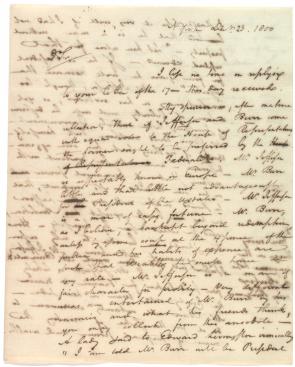In 1804, as Thomas Jefferson was running for a second term as President of the U.S., the race to be governor of New York was heating up. Burr (who was still the sitting vice president) ran against Morgan Lewis (a Democratic-Republican) on a Federalist platform. Although Burr had previously run for political office as a Democratic-Republican, he tried to build Federalist support for his campaign. (The popular sitting governor of New York, George Clinton, was replacing Aaron Burr in the presidential race as Thomas Jefferson’s choice for Vice President, and would be Vice President of the U.S. until his death in 1812… it’s a tangled web)

Hamilton’s notes, from a February 10, 1804 speech at a Federalist meeting in Albany lay out eight reasons why the Federalists should not support Burr for Governor and should instead support a Democratic-Republican candidate.
The first reason centered on Hamilton’s belief that Burr was a calculated politician, governed by his own ambition rather than by set principles. He wrote that Burr had been aligned with the Democratic-Republicans, either because he believed in those values (“from principle”) or because he thought that it would make it easier for him to win (“from calculation”). If Burr’s decision was based on his principles, Hamilton stated that he would not change his principles at a time when the Federalist party was struggling. If Burr had made a strategic decision, he was not going to “relinquish the ladder of his ambition” for the good of the Federalist party.
“Col Burr has steadily pursued the ⟨track⟩ of democratic policies. This he has done either from principle or from calculation. If the former he is not likely now to change his plan, when the federalists are prostrate and their enemies predominent. If the latter, he will certainly not at this time relinquish the ladder of his ambition and espouse the cause or views of the weaker party.”
Second, Hamilton described with begrudging respect that Burr was a talented politician who would be able to rally people around him
“it will be no difficult task for a man of talents intrigue and address possessing this chair of Government to rally the great body of them under his standard and thereby to consolidate for personal purposes the mass of Clintonians, his own adherents among the democrats and such federalists as from personal good will or interested motives may give him support.”
Hamilton also expressed his fear that Burr becoming governor would unite the democratic party:
“The effect of his elevation will be to reunite under a more adroit able and daring chief the now scattered fragments of the democratic party and to reinforce it by a strong detachment from the federalists.”
Hamilton expressed the fear that Burr would capitalize on the tendency of popular governments to “dissolution and disorder” and would build up popular prejudices and vices.
If he be truly, as the federalists have believed, a man of irregular and insatiable ambition; if his plan has been to rise to power on the ladder of Jacobinic principles, it is natural to conclude that he will endeavor to fix himself in power by the same instrument, that he will not lean on a fallen ⟨and⟩ falling party, generally speaking of a character not to favour usurpation and the ascendancy of a despotic chief. Every day shews more and more the much to be regretted tendency of Governments intirely popular to dissolution and disorder. Is it rational to expect, that a man who had the sagacity to foresee this tendency, and whose temper would permit him to bottom his aggrandisement on popular prejudices and vices would desert this system at a time, when more than ever the state of things invites him to adhere to it?
Although Lansing was a political enemy and an anti-Federalist who had vigorously opposed the Constitution and ruled against Hamilton as a judge, Hamilton believed that Lansing’s strength of personal character would protect the office.
If Lansing is Governor his personal character affords some security against pernicious extremes, and at the same time renders it morally certain, that the democratic party already much divided and weakened will moulder and break asunder more and more. This is certainly a state of things favorable to the future ascendancy of the wise and good. May it not lead to a recasting of parties by which the fœderalists will gain a great accession of force from former opponents?
Burr ultimately lost the election, and Morgan Lewis became the Governor of New York. Burr’s loss, in April 1804, happened just a few months before his duel with Hamilton in July 1804.







